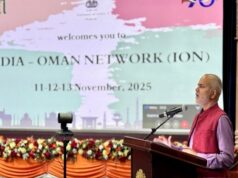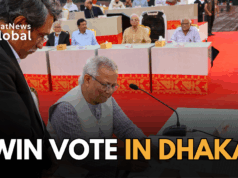It’s called the Two-Nation Theory — the political equivalent of dial-up internet. Slow, screechy, and somehow still around.
This week, Pakistan’s Army Chief, General Asim Munir, decided it was time to dust off this colonial relic and remind us that Hindus and Muslims are “different in every possible aspect.”
Every. Possible. Aspect. You know, like taste in biryani. Or… internet speeds.
According to the General, who’s also known as the “Mullah” General because he’s memorised the Quran, the very existence of Pakistan justifies this theory.
Because, obviously, when you have a functioning democracy, an independent judiciary, religious freedom, and progressive policies…Oh, wait… that’s the other neighbour.
But let’s humour this for a second. The idea was: Muslims and Hindus can’t coexist. Ergo, partition. Clean break. Problem solved.
Except…Bangladesh. Created because West and East Pakistan were too different to stay united. Same religion, sure — but language, culture, and let’s face it, how they made their tea… wildly different.
Result? One of the bloodiest liberation wars in modern history.
Apparently, no one told Dhaka about the “One Ummah” group chat. The fact that Dhaka is now demanding an apology from Islamabad for that atrocity before they kiss and make up is another matter.
Meanwhile, in West Asia: Sunni Saudi Arabia and Shia Iran are the religious siblings who can’t stop throwing plates at each other.
If Muslims are “one nation”, someone might want to tell Yemen, Syria, Iraq, Bahrain… or literally any mosque that has ever had a sectarian bombing.
India — the country that rejected the Two-Nation Theory—is home to the second-largest Muslim population in the world. Over 200 million. Living, working, voting — and yes, complaining on Instagram and X and to anyone else willing to listen. just like the rest of us.
India’s official response? “Kashmir’s only relation with Pakistan is of terrorism.”
Ouch. That’s not even diplomatic — that’s a parental burn.
So here’s something for the good general to mull over when he gets some spare time from reciting the Quran from memory:
Two-Nation Theory? Debunked by your own breakup.
Islamic unity? Debunked by your allies.
Minority treatment? Debunked by your record.
And yet, you want another Muslim homeland?
At this point, it’s less about ideology and more about, “Ma, India won’t let me have a separate room!”
The real problem isn’t Hindus vs. Muslims. It’s logic vs. nostalgia. A nostalgia for a theory that not only failed — it exploded on delivery.
So, General Munir, maybe the real “different in every aspect” isn’t Hindu vs. Muslim.
It’s reality vs. your speech to your expat countrymen.
The Partition is over, Chief. Feel free to partition your brain, but you might want to get a reality check before you announce that to the world.
In a career spanning three decades and counting, Ramananda (Ram to his friends) has been the foreign editor of The Telegraph, Outlook Magazine and the New Indian Express. He helped set up rediff.com’s editorial operations in San Jose and New York, helmed sify.com, and was the founder editor of India.com.
His work has featured in national and international publications like the Al Jazeera Centre for Studies, Global Times and Ashahi Shimbun. But his one constant over all these years, he says, has been the attempt to understand rising India’s place in the world.
He can rustle up a mean salad, his oil-less pepper chicken is to die for, and all it takes is some beer and rhythm and blues to rock his soul.
Talk to him about foreign and strategic affairs, media, South Asia, China, and of course India.




